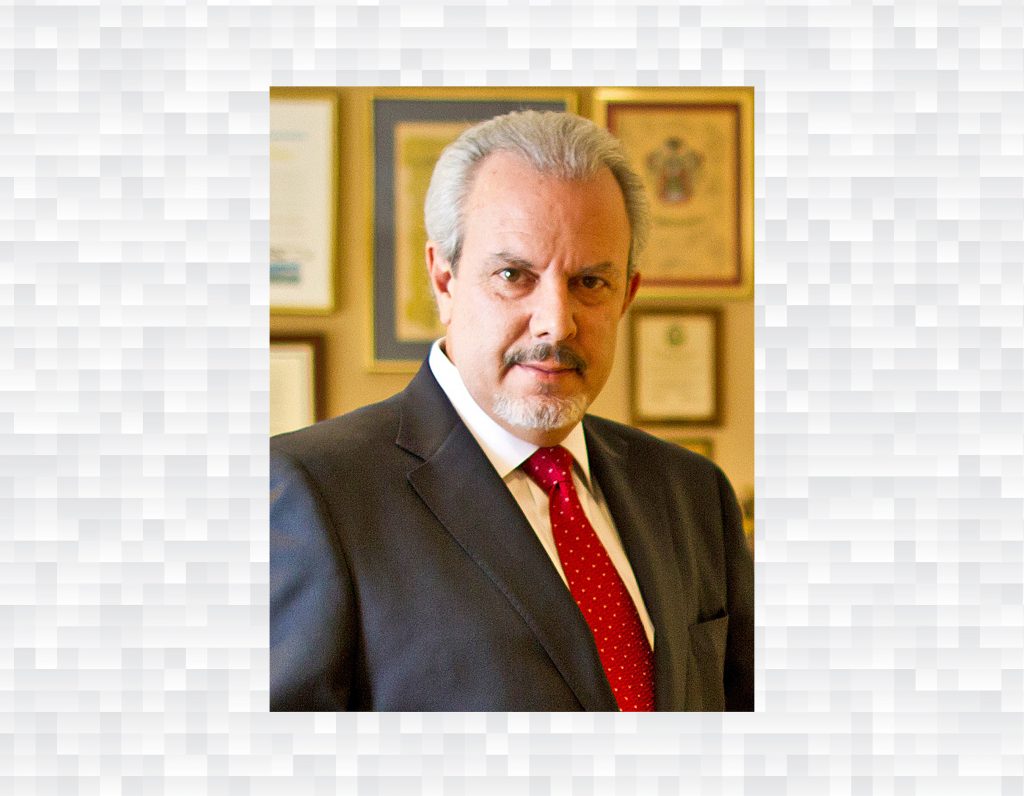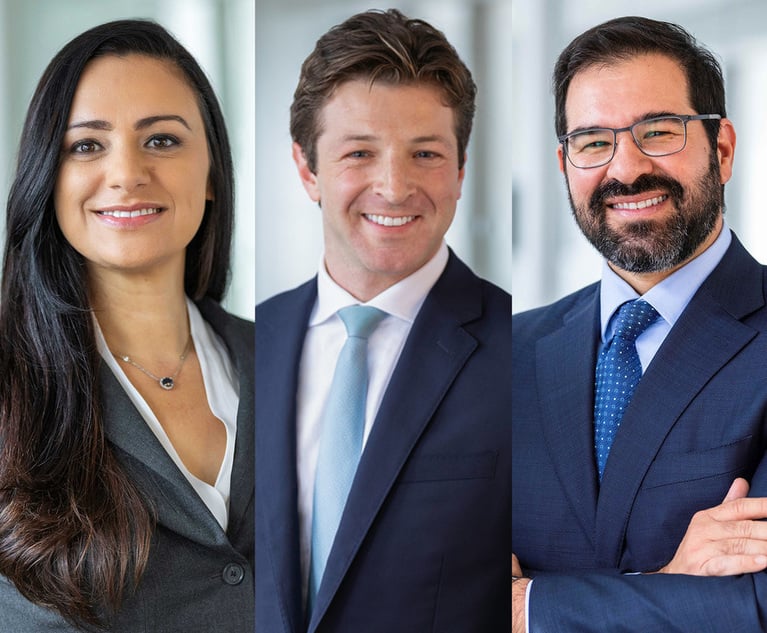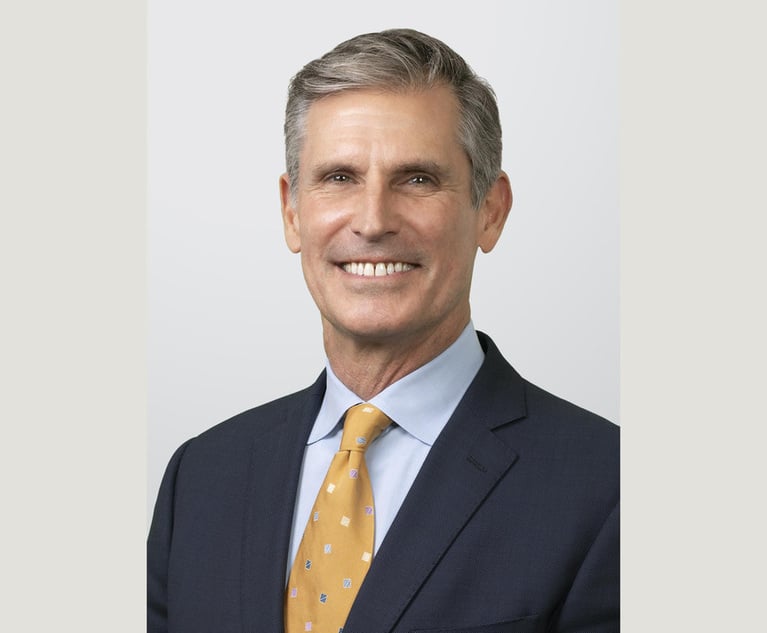Big Law Partner Saves the Music by Relocating Iconic Miami Festival
Miguel De Grandy, a land-use attorney in Holland & Knight's Miami office, argued before Miami city commissioners on Thursday to secure Ultra Music Festival's move to Miami Marine Stadium and Virginia Key Beach Park in March 2019. The festival had been held in Bayfront Park since 2012.
November 20, 2018 at 04:45 PM
5 minute read
 Miguel De Grandy, Holland & Knight. Courtesy photo
Miguel De Grandy, Holland & Knight. Courtesy photo
For a while it didn't seem as though Ultra Music Festival would close 2018 on a harmonious note. Mired in trademark litigation, the Miami staple and internationally adored electronic music festival was booted from its longtime home of Bayfront Park during a contentious Sept. 27 Miami City Commission meeting.
But with the help of land-use attorney Miguel De Grandy, the festival's future is not only looking brighter, but more scenic as well.
On Thursday, De Grandy secured four out of five votes from Miami city commissioners approving Ultra Music Festival's bid to host the event at Virginia Key on March 29-31, 2019. Under the new agreement, organizers of the centerpiece of Miami Music Week will pay the city $2 million for the use of Miami Marine Stadium and Historic Virginia Key Beach Park to accommodate its infamously lavish stages.
“The majority of the activity will be on the Miami Marine parcel,” De Grandy told the Daily Business Review. “The other 20 to 25 percent will be in the Historic Virginia Key Beach area.”
Despite being retained less than two weeks before the hearing, De Grandy was quickly brought up to speed. The attorney, a partner with Miami's Holland & Knight office, had to navigate a number of challenges and concerns over his client's prospective move.
Foremost among them was the presence of another event, Rapture Electronic Music Festival, on the same grounds and on the same dates sought by Ultra.
De Grandy disputed Rapture's claim that a contract had already been signed with Miami for its 2019 edition.
“We were surprised by Rapture's claim because we were unable to find any actually executed contract,” De Grandy said. “We monitor City of Miami Commission meetings and we know [Rapture representatives] haven't been to meetings like we have.”
Significant objections against Ultra's move were also raised by Key Biscayne residents, who mounted a movement against the festival, according to Miami New Times.
“It's unfortunate that they engaged in a campaign of deceptive advertising,” De Grandy said when asked about their efforts. He added that Ultra Music Festival has had no major incidents since 2015 and carries a zero-tolerance substance policy aided in part by its “amnesty box” program for illegal drugs.
“One thing I've learned in the 37 years of practicing law is you don't engage in deceptive practices if the law is on your side,” De Grandy quipped.
Read the agreement between Ultra Music Festival and the City of Miami here:
And now, organizers will spend considerable resources to address traffic fallout, their attorney said.
“We're going to do everything possible to minimize the transportation impact,” De Grandy said, acknowledging that unlike Bayfront Park, Virginia Key is traditionally only accessible by one route: the Rickenbacker Causeway.
“Contrast to the staging at Bayfront Park, where we didn't spend a penny on transportation, we're going to be spending hundreds of thousands of dollars on a transportation plan,” De Grandy said. He added his client is currently identifying parking options as well as the possibility of arranging buses, ferries and water taxis to transport festival attendees to their destination.
Speaking on the environmental concerns, De Grandy said the beach of Historic Virginia Key Beach Park will be closed off using concrete barriers as well as 10- to 12-foot fencing. And to control the noise, the decibel levels will not differ from what Rapture would have offered.
The agreement between Ultra and Miami to host the festival at Virginia Key is a five-year revocable license. It stipulates that should the city decide to terminate the agreement, it must give notice at least 364 days before the next scheduled iteration.
Reflecting on the possibility of further haggling over Ultra's next location, De Grandy said “whether someone wants to take legal action or not is their prerogative.”
“The city … made it very clear to the city manager that they were [willing] to sit down, meet with Rapture and accommodate different dates to stage their event,” he said in response to the prospect of making arrangements with their newfound competitors. “I think that'd be the best of both worlds. Both can co-exist happily, peacefully and musically.”
Related stories:
Ultra Music Festival Licensor Wins Appeal Against Co-Founder's Brother
Ultra Music Festival Litigation Shows No Sign of Stopping Despite Verdicts in Federal Court
Big Law Mustering for Suit Over Florida Recount in Race Between Rick Scott and Bill Nelson
This content has been archived. It is available through our partners, LexisNexis® and Bloomberg Law.
To view this content, please continue to their sites.
Not a Lexis Subscriber?
Subscribe Now
Not a Bloomberg Law Subscriber?
Subscribe Now
NOT FOR REPRINT
© 2025 ALM Global, LLC, All Rights Reserved. Request academic re-use from www.copyright.com. All other uses, submit a request to [email protected]. For more information visit Asset & Logo Licensing.
You Might Like
View All
Florida Judge Denies Motion to Dismiss in $150M Plane Crash Lawsuit Involving Flow La Movie
3 minute read

Holland & Knight Expands Corporate Practice in Texas With Former Greenberg Traurig Partner
3 minute read
Forum Clause Axes $844M Case Against Reinsurer Over Deadly Plane Crash, Judge Rules
Trending Stories
Who Got The Work
J. Brugh Lower of Gibbons has entered an appearance for industrial equipment supplier Devco Corporation in a pending trademark infringement lawsuit. The suit, accusing the defendant of selling knock-off Graco products, was filed Dec. 18 in New Jersey District Court by Rivkin Radler on behalf of Graco Inc. and Graco Minnesota. The case, assigned to U.S. District Judge Zahid N. Quraishi, is 3:24-cv-11294, Graco Inc. et al v. Devco Corporation.
Who Got The Work
Rebecca Maller-Stein and Kent A. Yalowitz of Arnold & Porter Kaye Scholer have entered their appearances for Hanaco Venture Capital and its executives, Lior Prosor and David Frankel, in a pending securities lawsuit. The action, filed on Dec. 24 in New York Southern District Court by Zell, Aron & Co. on behalf of Goldeneye Advisors, accuses the defendants of negligently and fraudulently managing the plaintiff's $1 million investment. The case, assigned to U.S. District Judge Vernon S. Broderick, is 1:24-cv-09918, Goldeneye Advisors, LLC v. Hanaco Venture Capital, Ltd. et al.
Who Got The Work
Attorneys from A&O Shearman has stepped in as defense counsel for Toronto-Dominion Bank and other defendants in a pending securities class action. The suit, filed Dec. 11 in New York Southern District Court by Bleichmar Fonti & Auld, accuses the defendants of concealing the bank's 'pervasive' deficiencies in regards to its compliance with the Bank Secrecy Act and the quality of its anti-money laundering controls. The case, assigned to U.S. District Judge Arun Subramanian, is 1:24-cv-09445, Gonzalez v. The Toronto-Dominion Bank et al.
Who Got The Work
Crown Castle International, a Pennsylvania company providing shared communications infrastructure, has turned to Luke D. Wolf of Gordon Rees Scully Mansukhani to fend off a pending breach-of-contract lawsuit. The court action, filed Nov. 25 in Michigan Eastern District Court by Hooper Hathaway PC on behalf of The Town Residences LLC, accuses Crown Castle of failing to transfer approximately $30,000 in utility payments from T-Mobile in breach of a roof-top lease and assignment agreement. The case, assigned to U.S. District Judge Susan K. Declercq, is 2:24-cv-13131, The Town Residences LLC v. T-Mobile US, Inc. et al.
Who Got The Work
Wilfred P. Coronato and Daniel M. Schwartz of McCarter & English have stepped in as defense counsel to Electrolux Home Products Inc. in a pending product liability lawsuit. The court action, filed Nov. 26 in New York Eastern District Court by Poulos Lopiccolo PC and Nagel Rice LLP on behalf of David Stern, alleges that the defendant's refrigerators’ drawers and shelving repeatedly break and fall apart within months after purchase. The case, assigned to U.S. District Judge Joan M. Azrack, is 2:24-cv-08204, Stern v. Electrolux Home Products, Inc.
Featured Firms
Law Offices of Gary Martin Hays & Associates, P.C.
(470) 294-1674
Law Offices of Mark E. Salomone
(857) 444-6468
Smith & Hassler
(713) 739-1250






